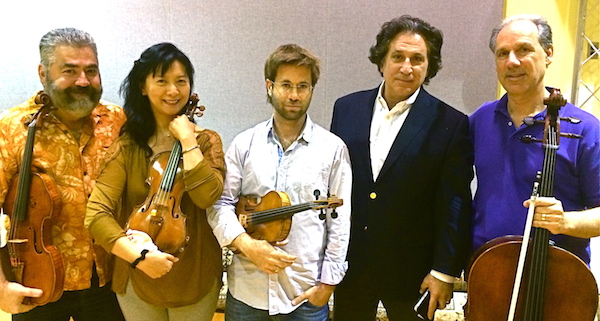
Sunday solace from the summer heat

The members of the Delray String QUartet with the composer Richard Danielpour
It shouldn’t surprise, but it does, that on a Sunday afternoon in summer, when the beach and outdoor activities become a logical priority, a chamber music concert would draw an audience as large – and as comforting to a music lover – as the one that came together at the Biltmore Hotel’s Alhambra Ballroom for another evening of the Mainly Mozart Festival.
The world premiere of Richard Danielpour’s String Quartet No. 7 (Psalms of Solace), performed by the Delray String Quartet and soprano Maria Aleida, was the evening’s pièce de resistance. One of the most prolific of American composers in all musical genres, Danielpour is specially known for his chamber pieces, which grant preeminence to the human voice as an expressive vehicle. Examples are Margaret Garner (an opera), Songs of Solitude and War Songs (both written for baritone Thomas Hampson), Elegies (in memory of Frederica von Stade’s father) and American Requiem, whose publication coincided with the 9/11 attacks. Born in New York of Iranian parents who fled their country when the shah was overthrown, Danielpour has preserved his emotional links to Iran and describes himself as “an American composer with Persian memory.”
References to the oppressed and the brave pervade his entire oeuvre, especially his quartets, which carry such meaningful titles as Requiem, Shadow Dances, Apparitions, Addio, Psalms of Sorrow and Psalms of Solace. The last contains lyrics in Hebrew and English taken from Psalms 40 and 96, the Book of Isaiah and the Gospel according to Luke. A somber, accessible piece, it is suffused with mourning through the first three movements, then achieves resolution in the fourth, thanks to a serene vocal line that overpowers the strings, bringing in liberating light in the final verse: “The kingdom of God is within you.” The work enables the various string instruments to show off in succession and ends with the inclusion of voice as the fifth string. Maria Aleida’s voice came through clear and sparkling, differentiating itself from the framework created by the violins, viola and cello. It should be noted that the Delray ensemble is currently recording the a series of Danielpour quartets.
The quartet was preceded by the third suite of Ottorino Respighi’s Ancient Airs and Dances, which opened the concert with just the right touch of elegance and amiability. The version for string quartet highlights the pastoral nature of the work inspired by Monteverdi, Vivaldi and Frescobaldi, with the various parallel voices imitating the lute and other ancient instruments. First came Schubert’s String Quartet No. 10 in E Flat Major, a work from his adolescent years that exhibits the influence of Mozart. Though appropriate within the context of the program, it seemed a bit light and insignificant considering the depth and vigor of the composer’s later works. The Delray quartet conveyed both its grace and its rusticity with appropriate vehemence and concluded with Mozart’s Exsultate Jubilate reduced for string quartet. The ensemble acquitted itself admirably in the execution of a devilishly difficult work in which violins replace the ornamentation of the oboe and horn, a paean to the joy embodied in the human voice. Composed for the castrato Rauzzini, it is a bravura piece popularized by sopranos and mezzo-sopranos that thanks to the freshness and ease of Maria Aleida’s timbre provided a perfect complement to the strings. Making judicious use of the vibrato, the soprano was as un-operatic as possible, adapting to the original liturgical context without lapsing into excesses as easy as they are tempting to a soubrette.
It was another valuable installment of a festival that carries on an indispensable tradition in the torrid summer of a city that, unlikely as it seems, needs music as much as it does water.
Next concert: Sunday, June 7. Click here to get all the info.
Recent Content
-
Artsarticle ·
-
Artsarticle ·
-
Artsarticle ·
